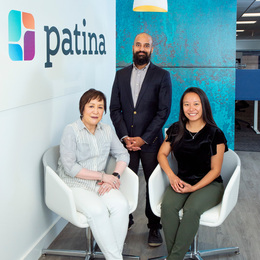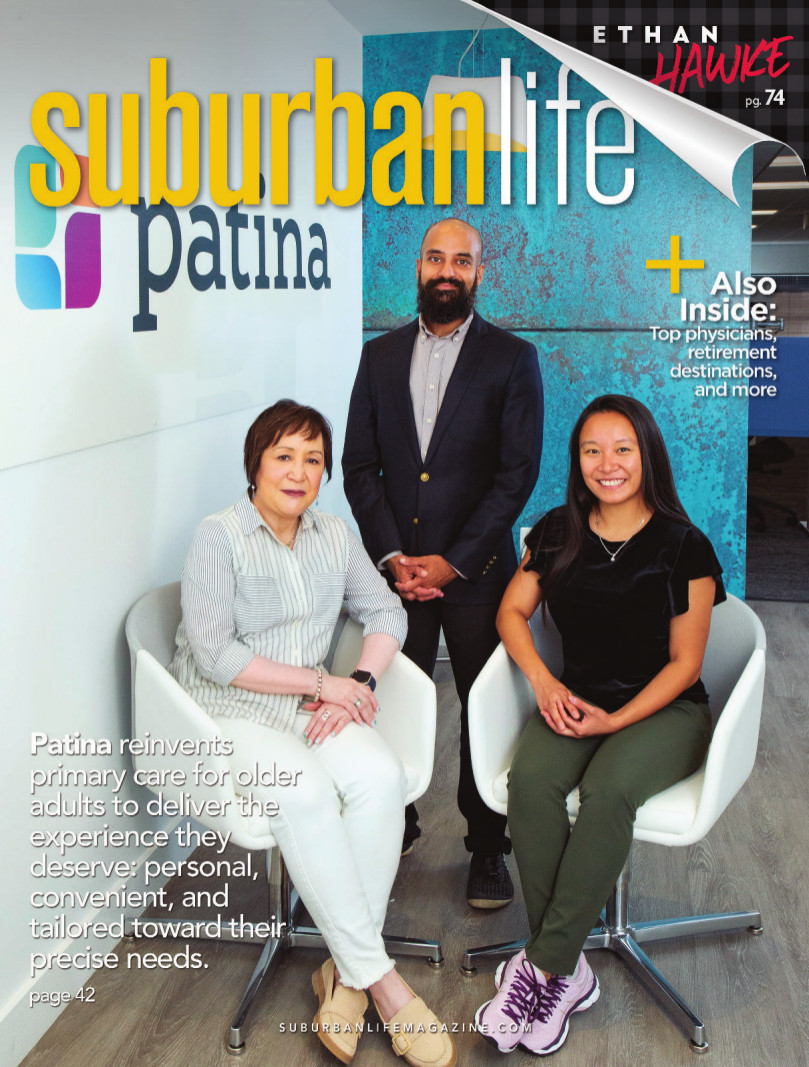
A Different Path
Patina reinvents primary care for older adults to deliver the experience they deserve: personal, convenient, and tailored toward their precise needs.
It’s a universal truth: The human body requires more medical care as it ages. Even so, receiving qualified care is rarely as easy as it should be. The traditional model of primary care in the United States often falls short, especially for adults aged 65 and older, who can come away from their experience feeling underserved, overlooked, even invisible.
Neil N. Patel, M.D., believes primary care does not have to be this way. In fact, he’s part of an innovative Philadelphia-area company that’s turning back to tradition in order to solve today’s broken system.
“If you’re working in medicine, you have a responsibility to help solve problems,” says Dr. Patel, chief health officer of Patina, a new model of primary care offered across the five-county Philadelphia area. “Also, if the system is failing us, we have a responsibility to fix that, too. By starting over, Patina has been able to rethink and rebuild from scratch, all in the name of the care and outcomes we think adults 65 and older deserve.”
Patina, which began seeing patients in February 2022, aims to reinvent primary care for older adults and their loved ones. Built on the principles of accessibility, convenience, and respecting people’s own values and preferences, Patina offers in-home care delivered by a primary care team that specializes in working with older adults. The care team performs in-person and virtual visits, assisted by an easy-to-use smartphone app that connects patients (and their loved ones, if applicable) with their care team around the clock.
In Dr. Patel’s mind, the relationship between a primary care practitioner and a patient should be based on trust, where the provider fully understands the patient’s specific goals and the patient feels empowered to make informed decisions. He believes a provider must devote the time and energy to getting to know their patients and loved ones—not only their health and history, but also what’s important to them.
“As the patient, your values and preferences matter incredibly,” he adds. “You should expect your care plan to be tailored and to include a menu of options. How do you want your primary care physician to work with you? Do you like intervention, or do you prefer to leave things alone unless you have to? Your primary care practitioner should be asking you these questions.
“Health care goes better when patients take the lead,” he continues. “That’s a lot to ask of people when they’re feeling sick or have a chronic illness they don’t understand. My job is to help you take the lead. If you’re the patient, you ought to entrust your health to a primary care team that makes you feel like a leader in your own care.”
The traditional primary-care model is inconvenient for busy adults. Getting care presents a number of logistical challenges and obstacles to older adults: making an appointment that may be weeks delayed, arranging travel to a doctor’s office, sitting in a crowded waiting room, spending a few minutes with the doctor, and then having to complete the return trip home—often for an experience that feels rushed. What’s more, the majority of clinicians are not experts in the needs of older adults.
Since March 2020, when the COVID-19 pandemic made telemedicine a necessity, patients of all ages have become increasingly comfortable meeting with clinicians through a computer screen. Organizations such as Patina have since stepped in, blending telemedicine and hands-on care in seamless fashion.
“There’s no replacement for an old-fashioned physical exam, but not all care should be conducted through these kinds of visits,” Dr. Patel says. “If you’re receiving care only in person, you’re trying to squeeze as much as possible into 15, 20, 30 minutes. At Patina, a lot of care happens in convenient virtual visits, so patients don’t feel they have to ‘save up’ all their symptoms for weeks or months. Instead of infrequent office visits, short video calls can be plenty of time to check in with a patient and make needed adjustments to the care plan that, along the way, can make a big difference.”
Going the Extra Mile
Older adults in the United States often face other barriers to capable care. Some tend to feel marginalized, as if their age makes them less seen or their voices unable to be heard. Michelle Lu, NP, saw evidence of this ageism while working in more traditional healthcare environments before joining Patina as a primary care practitioner. Having grown up in a family that revered its elders, Lu believes older adults deserve care from a provider who not only understands them, but also enjoys working with them.
Older adults in the United States often face other barriers to capable care. Some tend to feel marginalized, as if their age makes them less seen or their voices unable to be heard. Michelle Lu, NP, saw evidence of this ageism while working in more traditional healthcare environments before joining Patina as a primary care practitioner. Having grown up in a family that revered its elders, Lu believes older adults deserve care from a provider who not only understands them, but also enjoys working with them.
“My grandmother raised me for the first four years of my life,” says Lu, who trained as a nurse practitioner in gerontology. “She was in her 60s at the time, and she was a real force in my family. In nursing school, I found a lot of meaning working with the older population—the richness of their stories, their unapologetic sense of self. I think everyone here at Patina has that same passion. We’re inspired by these patients who continue to lead beautiful, productive lives.”
Lu spends most of each workday visiting patients. While most of these visits are done by video, she works with a Patina nurse champion who meets patients in person when needed. In-person visits serve to not only assess the patient’s health, but also assess the patient’s home for any safety risks. During face-to-face meetings, information gleaned from prior virtual visits helps clinicians prioritize their time to best serve patients’ needs.
“We treat a broad spectrum in terms of clinical complexities,” Lu adds. “We have ‘young’ 65-plus adults who are still very active, but it’s disruptive for them to go to a primary care doctor’s office; they like the convenience of on-demand care and a mobile app. Another example is the person with multiple chronic conditions, where visiting specialists may feel like a full-time job and the virtual model provides a welcome relief. These individuals often require more small, frequent touches to monitor their health and make changes if things deviate. A third type of person may prefer staying in the home, and that can be for a variety of reasons: mobility challenges, difficulty accessing transportation, or simply wanting to avoid the stress of visiting a crowded doctor’s office and being around people who are ill.”
Every Patina patient has on-demand access to a dedicated care team, which includes a primary care practitioner and a health champion. Essentially, a health champion is a navigator of sorts, someone devoted to connecting patients with care and community resources, and ensuring stress-free transitions to and from hospitals, clinics, and other healthcare facilities.
“Basically, I’m an advocate for the things our patients need help with,” says Valerie Voluntad, a health champion with Patina. “Health care is complicated; it shouldn’t be, but it is. If someone needs help with transportation to a specialist’s appointment, I can help them arrange that. If they need lab work for a specialist, I can help coordinate that so they don’t have to go back multiple times. If they need help paying for prescription drugs because the prices have gone up, I look for ways to help bring them back down. We are like pit bulls when it comes to finding resources.”
Voluntad spent most of her career in social services, and also has been a caregiver for much of her adult life—first, for her ailing brother, then for her father, and now for her 89-year-old mother. She joined Patina because she believed in the company’s mission and in her fellow care providers.
“We’re here to go the extra mile,” she adds. “At Patina, we like to share a quote from Margaret Mead that I’ve always found inspirational: ‘Never doubt that a small group of thoughtful, committed citizens can change the world.’ I always think of that when I’m working with our patients.”
While Patina currently serves patients in Bucks, Chester, Delaware, Montgomery, and Philadelphia counties, Dr. Patel expects that to soon change.
“We believe we’re onto something,” he says. “As we continue to learn and grow, we want to bring Patina to other places around the country. Everyone should have the opportunity to get care that helps them live well and age with the independence and respect they deserve.”
For more information on Patina, call (855) 478-8310 or visit patinahealth.com.
For more information on Patina, call (855) 478-8310 or visit patinahealth.com.
Photo by Alison Dunlap
Published (and copyrighted) in Suburban Life magazine, August 2022.



